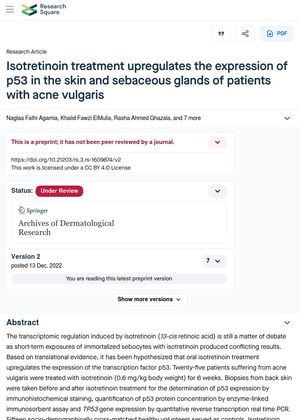Isotretinoin Treatment Upregulates the Expression of P53 in the Skin and Sebaceous Glands of Patients With Acne Vulgaris
December 2022
in “
Research Square (Research Square)
”

TLDR Isotretinoin treatment increases p53 levels in the skin, which may explain its effectiveness against acne.
The study investigated the effects of isotretinoin treatment on the expression of the transcription factor p53 in 25 patients with acne vulgaris. The patients were treated with isotretinoin (0.6 mg/kg body weight) for 6 weeks, and biopsies from back skin were taken before and after treatment to determine p53 expression. The results showed that isotretinoin treatment significantly increased the nuclear expression of p53 in sebaceous glands and in the skin, compared to pre-treatment levels and untreated controls. The level of p53 expression was inversely correlated with acne severity score and body mass index. The study concluded that isotretinoin induced the expression of p53, which controls multiple transcription factors involved in the pathogenesis of acne vulgaris, explaining the transcriptomic changes causing sebum suppression and the adverse effects associated with systemic isotretinoin therapy.





